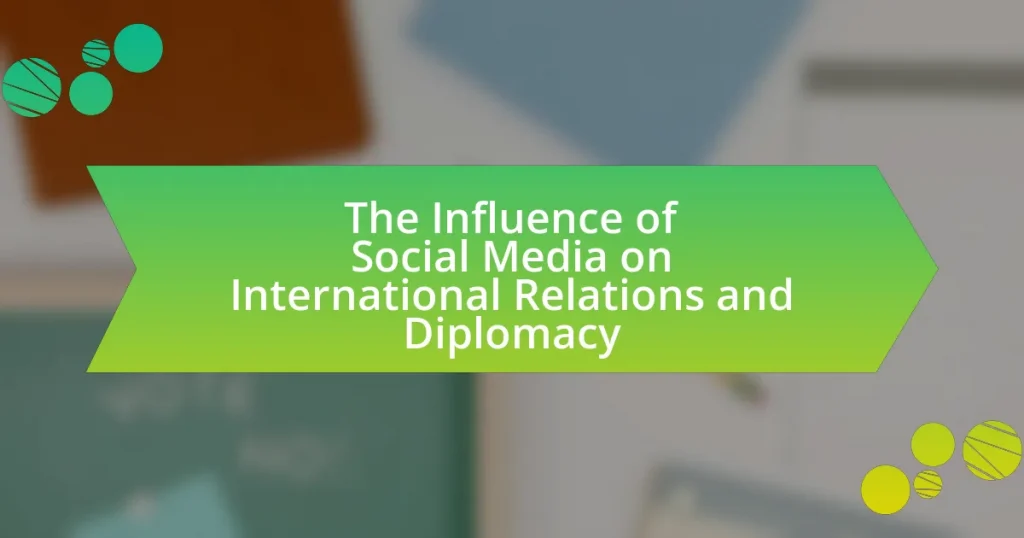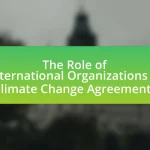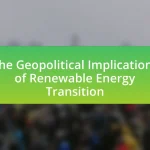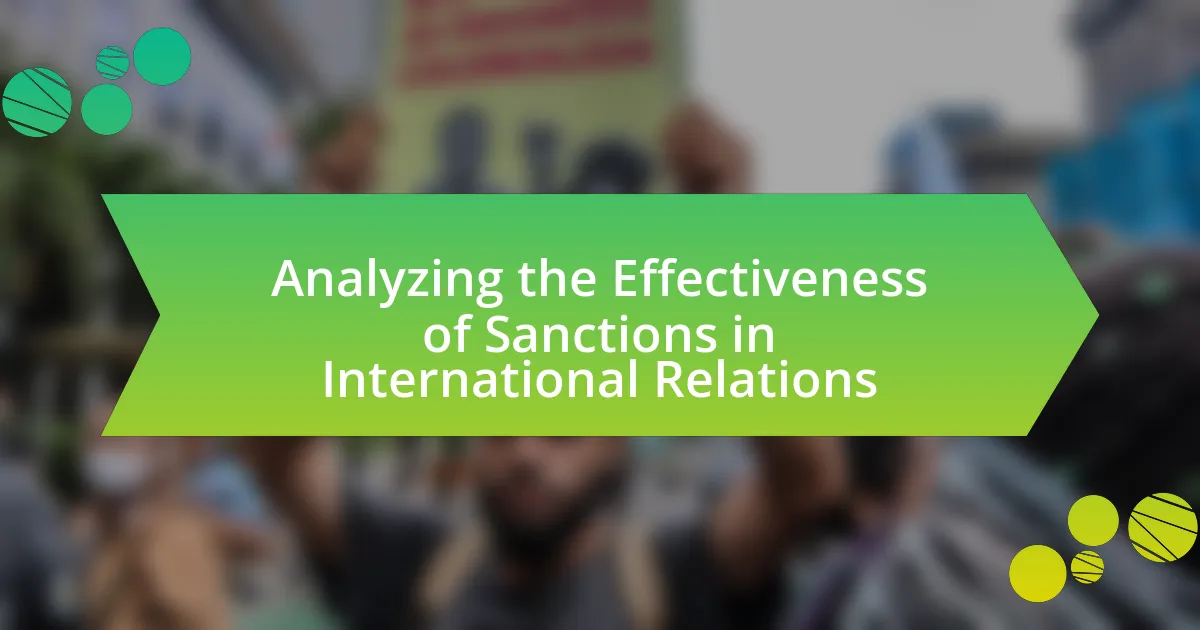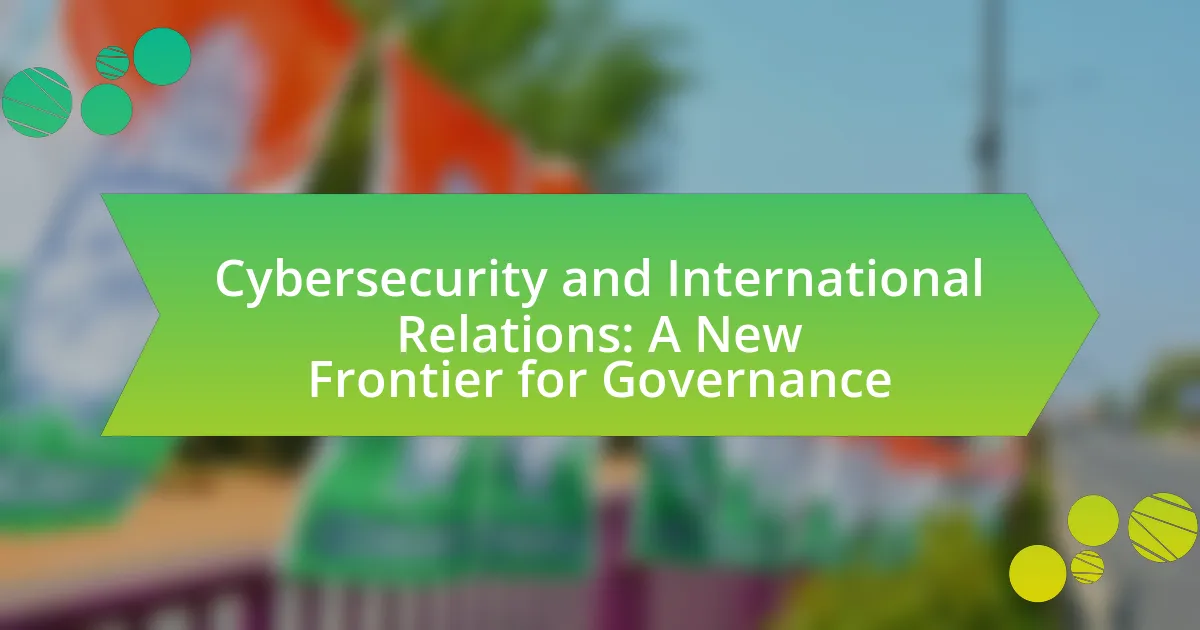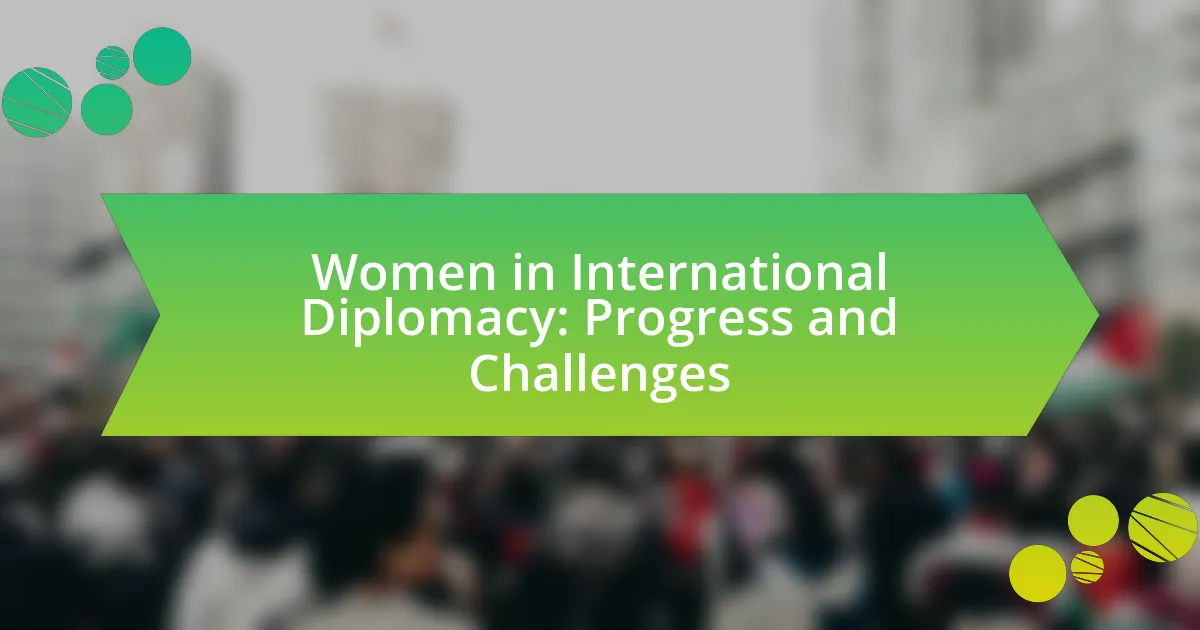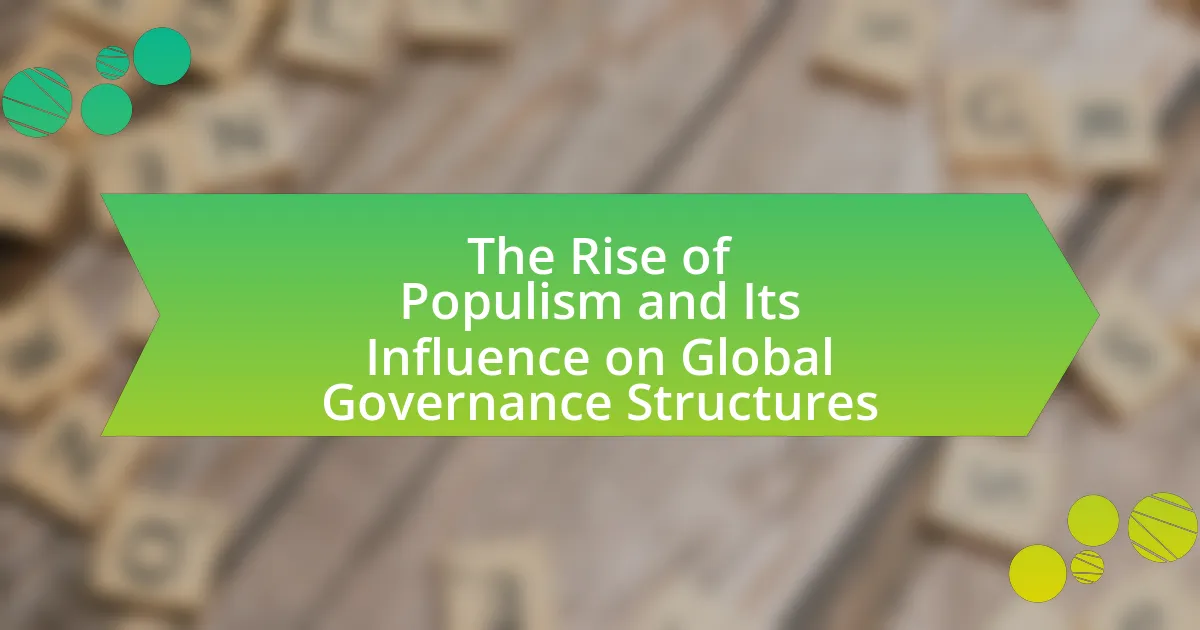The article examines the significant influence of social media on international relations and diplomacy, highlighting its role in real-time communication, public opinion shaping, and diplomatic strategies. It discusses how platforms like Twitter and Facebook have transformed international communication, facilitated grassroots movements, and served as tools for soft power. The article also addresses the challenges posed by misinformation, rapid communication, and the complexities introduced to traditional diplomatic practices. Additionally, it outlines best practices for diplomats engaging on social media, emphasizing the importance of transparency, security, and effective outreach strategies.
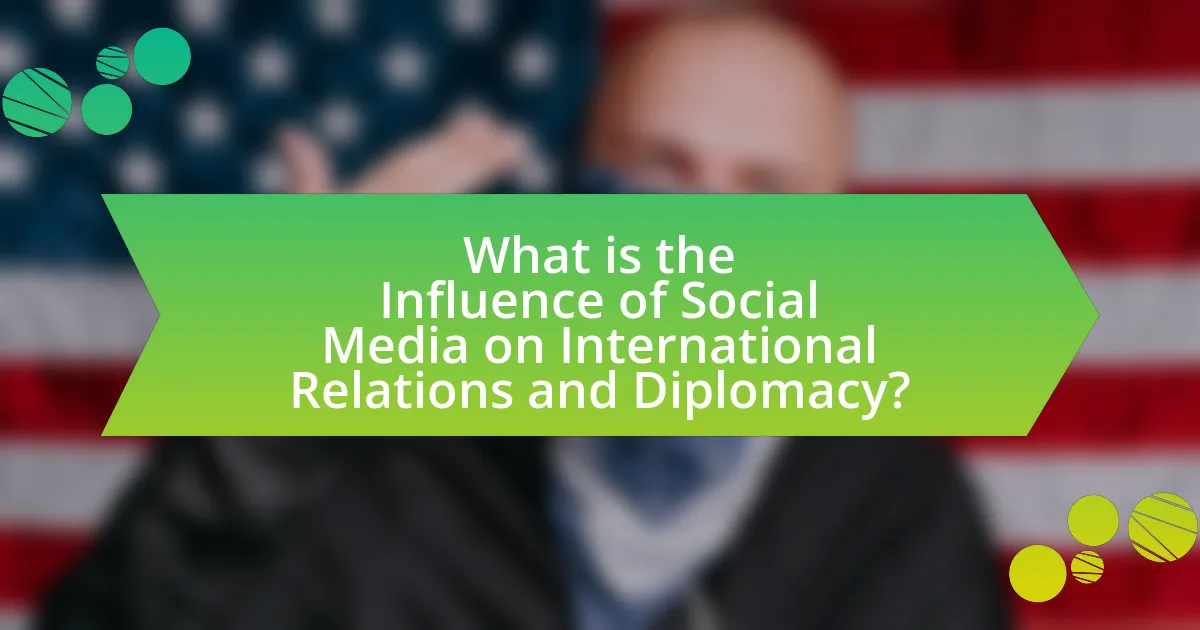
What is the Influence of Social Media on International Relations and Diplomacy?
Social media significantly influences international relations and diplomacy by enabling real-time communication and information dissemination among states, non-state actors, and the public. This platform allows governments to engage directly with foreign populations, shaping perceptions and public opinion, as seen during the Arab Spring when social media facilitated protests and mobilized support against authoritarian regimes. Additionally, social media serves as a tool for diplomacy, exemplified by the use of Twitter by leaders like Donald Trump, who communicated foreign policy decisions and reactions instantly, impacting diplomatic relations. The immediacy and reach of social media can also lead to rapid responses to international crises, as evidenced by the global reaction to events like the Syrian civil war, where social media played a crucial role in raising awareness and mobilizing humanitarian efforts.
How has social media changed the landscape of international communication?
Social media has transformed international communication by enabling real-time interaction and information sharing across borders. Platforms like Twitter and Facebook allow individuals, organizations, and governments to disseminate messages instantly, bypassing traditional media gatekeepers. For instance, during the Arab Spring, social media played a crucial role in mobilizing protests and spreading awareness globally, demonstrating its power in shaping political discourse. Additionally, social media facilitates direct engagement between leaders and citizens, fostering transparency and accountability in governance. According to a 2020 Pew Research Center study, 53% of adults in 11 emerging economies reported using social media to engage with political issues, highlighting its growing influence in international dialogue.
What role does social media play in shaping public opinion on global issues?
Social media significantly influences public opinion on global issues by providing a platform for rapid information dissemination and engagement. It allows individuals to access diverse perspectives and share their views, which can amplify certain narratives and shape collective perceptions. For instance, during the Arab Spring, social media was pivotal in mobilizing protests and raising awareness about political repression, demonstrating its power to influence public sentiment and action on a global scale. Additionally, studies indicate that social media can create echo chambers, where users are exposed primarily to viewpoints that reinforce their beliefs, further impacting public opinion formation.
How do governments utilize social media for diplomatic purposes?
Governments utilize social media for diplomatic purposes by engaging in direct communication with foreign populations, shaping public perception, and promoting national interests. For instance, platforms like Twitter and Facebook allow officials to disseminate information quickly, bypassing traditional media channels. This direct engagement can enhance transparency and foster a sense of connection with citizens abroad. Additionally, social media campaigns can be strategically designed to counter misinformation or to highlight humanitarian efforts, as seen in various diplomatic initiatives during crises. The U.S. State Department, for example, has employed social media to promote democracy and human rights, demonstrating its effectiveness in influencing international dialogue and public opinion.
Why is social media considered a tool for soft power in diplomacy?
Social media is considered a tool for soft power in diplomacy because it enables countries to influence global public opinion and foster cultural exchange without coercion. By utilizing platforms like Twitter, Facebook, and Instagram, nations can share their values, promote their culture, and engage with foreign audiences directly. For instance, the U.S. State Department has employed social media campaigns to enhance its image and counter misinformation, demonstrating how digital engagement can shape perceptions and build relationships. This approach aligns with Joseph Nye’s concept of soft power, which emphasizes attraction over coercion, highlighting the effectiveness of social media in modern diplomatic strategies.
What examples illustrate the use of social media as a soft power tool?
Social media serves as a soft power tool through various examples, notably the Arab Spring and the #BlackLivesMatter movement. During the Arab Spring, platforms like Twitter and Facebook facilitated the organization of protests and the dissemination of information, enabling citizens to challenge authoritarian regimes and garner international support. This use of social media demonstrated the ability to influence political change and mobilize public opinion globally. Similarly, the #BlackLivesMatter movement utilized social media to raise awareness about racial injustice, engage a global audience, and influence policy discussions, showcasing how digital platforms can amplify voices and foster solidarity across borders. These instances illustrate how social media can effectively project a nation’s values and ideals, enhancing its soft power in the international arena.
How does social media enhance a country’s global image?
Social media enhances a country’s global image by providing a platform for real-time communication and engagement with international audiences. This immediacy allows countries to showcase their culture, values, and achievements directly to a global audience, fostering a positive perception. For instance, during events like the Olympics, countries utilize social media to highlight their athletes and national pride, which can lead to increased tourism and investment. Additionally, social media enables countries to respond swiftly to global events, shaping narratives and countering misinformation, thereby reinforcing their image as proactive and engaged on the world stage.
What challenges does social media pose to traditional diplomatic practices?
Social media challenges traditional diplomatic practices by accelerating the dissemination of information, which can lead to misinformation and rapid public reactions that diplomats must address. For instance, the Arab Spring demonstrated how social media mobilized public opinion and influenced political change, often outpacing official diplomatic channels. Additionally, social media platforms allow non-state actors to engage directly with the public and governments, undermining the exclusivity of traditional diplomatic negotiations. This shift complicates the diplomatic landscape, as states must now navigate a more fragmented and immediate communication environment, where public sentiment can quickly sway political decisions.
How can misinformation on social media impact international relations?
Misinformation on social media can significantly undermine international relations by fostering distrust among nations and escalating tensions. For instance, false narratives can lead to misinterpretations of a country’s intentions, prompting preemptive actions or retaliatory measures. A notable example is the spread of misinformation during the 2016 U.S. presidential election, which not only influenced domestic politics but also strained U.S.-Russia relations, as both countries accused each other of interference. Furthermore, studies indicate that misinformation can amplify existing conflicts, as seen in the case of the Rohingya crisis in Myanmar, where social media played a role in inciting violence against the Rohingya population through false information. This demonstrates that misinformation can distort perceptions, hinder diplomatic dialogue, and ultimately destabilize international relations.
What are the risks of rapid communication in diplomatic contexts?
Rapid communication in diplomatic contexts poses significant risks, including the potential for miscommunication, escalation of conflicts, and the spread of misinformation. Miscommunication can occur when messages are sent quickly without thorough vetting, leading to misunderstandings that may provoke unintended diplomatic incidents. For example, in 2017, a misinterpreted tweet by a U.S. official led to heightened tensions with North Korea. Additionally, rapid communication can escalate conflicts, as immediate reactions to provocative statements or actions can result in a swift cycle of retaliation, as seen during the 2014 Ukraine crisis, where rapid exchanges on social media intensified hostilities. Furthermore, the spread of misinformation can undermine trust and stability in international relations, as false narratives can quickly gain traction online, influencing public opinion and diplomatic negotiations. These risks highlight the complexities introduced by the immediacy of modern communication technologies in diplomacy.
How does social media influence public diplomacy strategies?
Social media significantly influences public diplomacy strategies by enabling real-time communication and engagement between governments and global audiences. This platform allows states to disseminate information quickly, shape narratives, and respond to public sentiment, which is crucial for effective diplomacy. For instance, during the Arab Spring, social media was instrumental in mobilizing public opinion and influencing political change, demonstrating its power in shaping diplomatic outcomes. Additionally, research by the Pew Research Center indicates that 69% of adults in the U.S. use social media, highlighting its role as a primary channel for public engagement and information dissemination in contemporary diplomacy.
What are the implications of social media for crisis communication in diplomacy?
Social media significantly alters crisis communication in diplomacy by enabling rapid information dissemination and real-time engagement. This immediacy allows diplomats to respond quickly to emerging situations, shaping narratives and countering misinformation effectively. For instance, during the Arab Spring, social media platforms facilitated the spread of information, influencing international responses and diplomatic strategies. Additionally, social media provides a direct channel for public diplomacy, allowing governments to communicate with global audiences, thereby enhancing transparency and accountability. The ability to monitor public sentiment through social media analytics also aids diplomats in tailoring their messages to resonate with specific audiences, ultimately impacting diplomatic relations and crisis management outcomes.
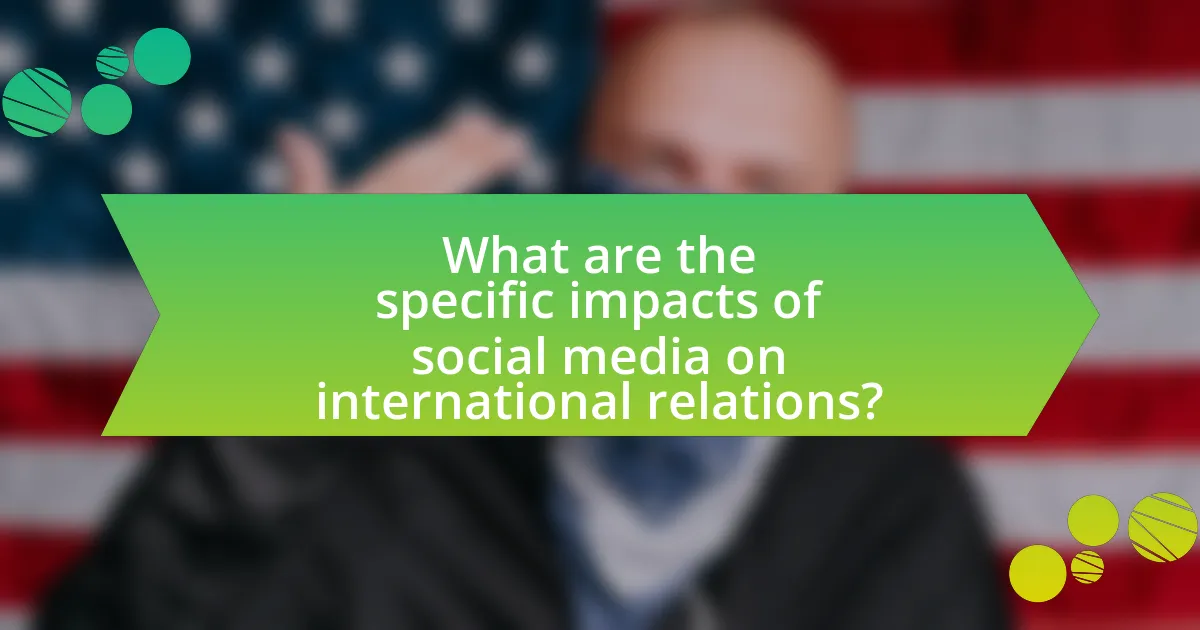
What are the specific impacts of social media on international relations?
Social media significantly impacts international relations by facilitating real-time communication, shaping public opinion, and influencing diplomatic strategies. The immediacy of platforms like Twitter and Facebook allows governments and organizations to disseminate information quickly, which can alter the dynamics of international diplomacy. For instance, during the Arab Spring, social media played a crucial role in mobilizing protests and shaping narratives, demonstrating its power to influence political outcomes. Additionally, social media enables non-state actors to engage in diplomacy, as seen with various NGOs and activist groups that leverage these platforms to advocate for human rights and environmental issues, thereby affecting state behavior and policy decisions.
How do social media platforms facilitate grassroots movements and activism?
Social media platforms facilitate grassroots movements and activism by providing accessible communication channels that enable rapid information dissemination and community organization. These platforms allow individuals to share their experiences, mobilize supporters, and coordinate actions in real-time, significantly amplifying their reach. For instance, during the Arab Spring, social media was instrumental in organizing protests and sharing information, leading to widespread political change across multiple countries. Research by the Pew Research Center indicates that 69% of adults in the U.S. use social media, highlighting its potential as a tool for collective action and engagement in social issues.
What role do social media campaigns play in influencing policy changes?
Social media campaigns play a crucial role in influencing policy changes by amplifying public discourse and mobilizing grassroots movements. These campaigns enable individuals and organizations to disseminate information rapidly, engage large audiences, and create pressure on policymakers. For instance, the #MeToo movement utilized social media to raise awareness about sexual harassment, leading to significant legislative changes in various countries, including the passing of laws aimed at protecting victims. Additionally, studies show that social media can shape public opinion, which in turn affects political agendas and legislative priorities, as seen in the Arab Spring, where online activism contributed to regime changes.
How have social media movements affected diplomatic relations between countries?
Social media movements have significantly impacted diplomatic relations between countries by facilitating rapid communication and mobilization of public opinion. For instance, the Arab Spring demonstrated how platforms like Twitter and Facebook enabled citizens to organize protests, which in turn pressured governments and influenced foreign policy decisions. The U.S. government’s response to the Syrian civil war was partly shaped by social media narratives that highlighted humanitarian crises, leading to increased international scrutiny and intervention discussions. Additionally, social media has allowed non-state actors to gain visibility, affecting traditional diplomatic channels and strategies, as seen in the rise of global movements like Black Lives Matter, which prompted international dialogues on racial justice and human rights.
What is the relationship between social media and state-sponsored propaganda?
Social media serves as a powerful tool for state-sponsored propaganda by enabling governments to disseminate information rapidly and widely. This relationship is characterized by the ability of states to create and promote narratives that align with their political agendas, often targeting both domestic and international audiences. For instance, during the 2016 U.S. presidential election, Russian operatives utilized platforms like Facebook and Twitter to spread disinformation and influence public opinion, demonstrating how social media can be exploited for propaganda purposes. Additionally, studies have shown that state actors can manipulate algorithms and user engagement to amplify their messages, further solidifying the connection between social media and state-sponsored propaganda.
How do governments leverage social media for propaganda purposes?
Governments leverage social media for propaganda purposes by disseminating tailored messages that shape public perception and influence political narratives. They create and promote content that aligns with their strategic objectives, often utilizing algorithms to target specific demographics effectively. For instance, during the 2016 U.S. presidential election, Russian operatives used social media platforms to spread disinformation and polarize public opinion, demonstrating the capacity of social media to manipulate electoral outcomes. Additionally, state-sponsored accounts often amplify favorable news while suppressing dissenting voices, thereby controlling the narrative and reinforcing government agendas. This strategic use of social media has been documented in various studies, including the report by the Oxford Internet Institute, which highlights the role of social media in political communication and its implications for democracy.
What are the consequences of state-sponsored propaganda on international perceptions?
State-sponsored propaganda significantly alters international perceptions by shaping narratives that influence public opinion and diplomatic relations. This manipulation can lead to increased polarization between nations, as seen in the case of Russia’s use of propaganda during the Ukraine crisis, which aimed to justify military actions and sway global opinion in its favor. Additionally, state-sponsored propaganda can undermine trust in traditional media sources, as evidenced by the rise of misinformation campaigns that create skepticism towards foreign governments and institutions. Such tactics can result in strained diplomatic ties and heightened tensions, as countries respond to perceived threats or misinformation with counter-propaganda or sanctions.
How does social media affect the negotiation processes in diplomacy?
Social media significantly impacts negotiation processes in diplomacy by facilitating real-time communication and public engagement. This immediacy allows diplomats to gauge public sentiment and adjust their strategies accordingly, as seen during the Arab Spring when social media platforms were instrumental in mobilizing public opinion and influencing governmental responses. Furthermore, social media can amplify messages, creating pressure on negotiators to respond swiftly to public reactions, which can alter the dynamics of traditional diplomatic negotiations. For example, the use of Twitter by political leaders has led to rapid shifts in diplomatic stances, as seen in the U.S.-North Korea negotiations, where tweets from leaders influenced perceptions and expectations.
What are the advantages of using social media during negotiations?
Using social media during negotiations offers several advantages, including enhanced communication, broader reach, and real-time feedback. Enhanced communication allows negotiators to share information quickly and efficiently, facilitating a more dynamic exchange of ideas. The broader reach enables negotiators to connect with a wider audience, including stakeholders who may not be present in traditional negotiation settings. Real-time feedback allows for immediate responses to proposals or concerns, which can lead to quicker resolutions and adjustments in strategy. These advantages contribute to more effective and responsive negotiation processes in the context of international relations and diplomacy.
How can social media complicate diplomatic negotiations?
Social media can complicate diplomatic negotiations by amplifying public opinion and creating pressure on negotiators. The instantaneous nature of social media allows information, including sensitive diplomatic communications, to be disseminated rapidly, often leading to misinterpretations or escalations of conflict. For instance, during the Arab Spring, social media played a crucial role in mobilizing public sentiment, which influenced governmental responses and complicated negotiations between regimes and opposition groups. Additionally, social media can lead to the spread of misinformation, undermining trust between negotiating parties and making it difficult to reach consensus.
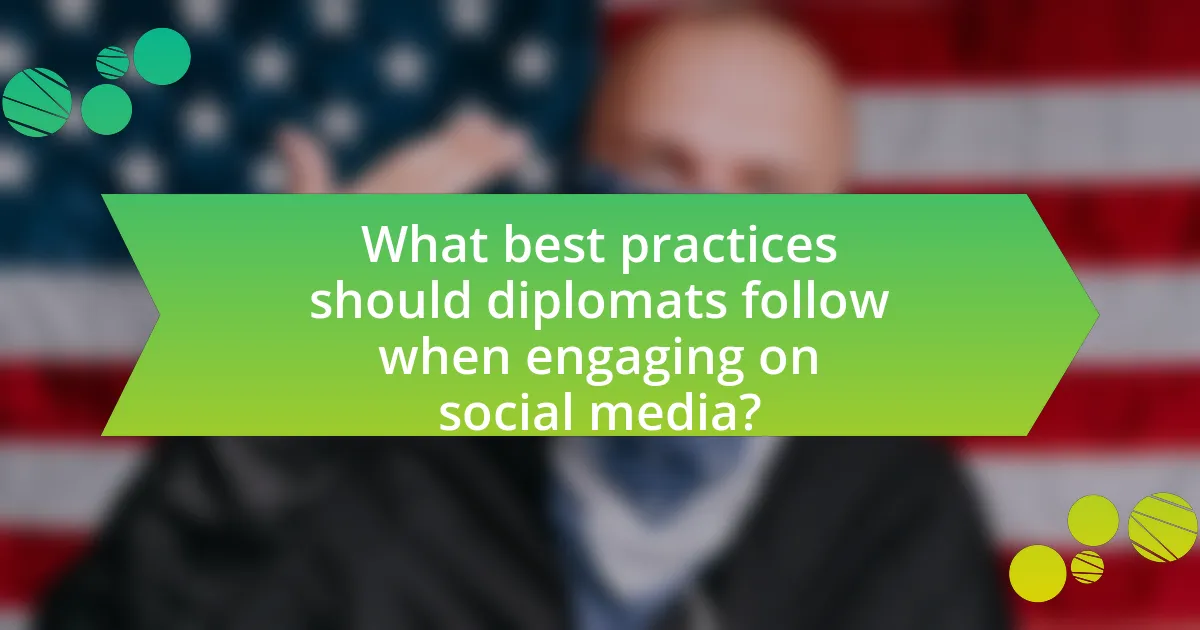
What best practices should diplomats follow when engaging on social media?
Diplomats should adhere to transparency, professionalism, and cultural sensitivity when engaging on social media. Transparency involves clearly communicating their roles and intentions, which fosters trust and credibility among audiences. Professionalism is crucial; diplomats must maintain a respectful tone and avoid controversial or inflammatory content that could damage diplomatic relations. Cultural sensitivity requires understanding the diverse backgrounds of their audience, ensuring that messages are appropriate and considerate of different cultural norms. These practices are supported by the increasing importance of social media in shaping public perception and diplomatic discourse, as evidenced by the rise of digital diplomacy initiatives by various governments.
How can diplomats effectively use social media to enhance their outreach?
Diplomats can effectively use social media to enhance their outreach by engaging directly with diverse audiences, sharing timely information, and fostering dialogue. By utilizing platforms like Twitter, Facebook, and Instagram, diplomats can disseminate messages quickly and interactively, reaching millions globally. For instance, the U.S. State Department has successfully used social media to promote initiatives and respond to crises, exemplifying how real-time communication can shape public perception and policy discussions. Additionally, studies show that social media engagement can increase transparency and trust, essential components in modern diplomacy, as seen in the Arab Spring where social media played a pivotal role in mobilizing public opinion.
What strategies can be employed to manage online reputation in diplomacy?
To manage online reputation in diplomacy, strategies such as proactive engagement, monitoring, and crisis management should be employed. Proactive engagement involves diplomats actively participating in social media discussions to shape narratives and build relationships with key stakeholders. Monitoring entails using tools to track mentions and sentiment regarding diplomatic entities, allowing for timely responses to misinformation or negative portrayals. Crisis management includes having a clear plan to address potential online reputation threats, ensuring that accurate information is disseminated quickly to mitigate damage. These strategies are essential as they help maintain credibility and foster trust in diplomatic relations, particularly in an era where social media can rapidly influence public perception.
How can diplomats balance transparency and confidentiality on social media?
Diplomats can balance transparency and confidentiality on social media by establishing clear guidelines that delineate what information can be shared publicly and what must remain confidential. These guidelines should be informed by the principles of diplomatic communication, which emphasize the importance of maintaining trust while engaging with the public. For instance, the U.S. Department of State has implemented social media policies that encourage transparency in sharing non-sensitive information while safeguarding classified or sensitive data. This approach allows diplomats to engage with audiences effectively while protecting national interests and sensitive diplomatic communications.
What are the key considerations for maintaining security in social media diplomacy?
Key considerations for maintaining security in social media diplomacy include safeguarding sensitive information, ensuring account integrity, and managing public perception. Safeguarding sensitive information involves implementing strong privacy settings and encryption to protect diplomatic communications from unauthorized access. Ensuring account integrity requires regular monitoring for unauthorized access and employing two-factor authentication to prevent hacking incidents. Managing public perception entails crafting clear and consistent messaging to mitigate misinformation and maintain credibility, as seen in instances where diplomatic statements were misrepresented on social media platforms. These considerations are crucial for effective and secure engagement in the digital diplomatic landscape.
How can diplomats protect sensitive information while using social media?
Diplomats can protect sensitive information while using social media by implementing strict privacy settings, avoiding the sharing of classified or sensitive content, and utilizing secure communication channels. Privacy settings on social media platforms can limit who sees their posts, reducing the risk of unauthorized access to sensitive information. Additionally, diplomats should refrain from discussing confidential matters online, as social media is inherently public and can be monitored by adversaries. Using secure messaging applications for sensitive discussions further enhances information security, as these platforms often provide end-to-end encryption, making it difficult for unauthorized parties to intercept communications.
What tools and practices can enhance security for diplomatic communications on social media?
To enhance security for diplomatic communications on social media, utilizing end-to-end encryption tools, implementing two-factor authentication, and conducting regular security audits are essential practices. End-to-end encryption ensures that only the intended recipients can read the messages, significantly reducing the risk of interception. For instance, platforms like Signal and WhatsApp provide robust encryption protocols that protect sensitive information. Two-factor authentication adds an extra layer of security by requiring a second form of verification, which can prevent unauthorized access to accounts. Regular security audits help identify vulnerabilities in social media accounts and communication practices, allowing for timely updates and improvements. These measures collectively strengthen the security framework necessary for safeguarding diplomatic communications in the digital age.
What lessons can be learned from successful social media diplomacy cases?
Successful social media diplomacy cases demonstrate the importance of timely communication, audience engagement, and strategic messaging. For instance, during the Arab Spring, social media platforms facilitated rapid information dissemination, allowing activists to mobilize support and raise awareness globally. This highlights the necessity for diplomats to adapt to real-time communication and leverage social media to connect with diverse audiences effectively. Additionally, the case of the U.S. State Department’s use of Twitter during crises illustrates how direct engagement can humanize diplomatic efforts and foster trust. These examples underscore that successful social media diplomacy relies on understanding the platform dynamics, crafting relatable content, and maintaining an authentic voice to resonate with the public.
